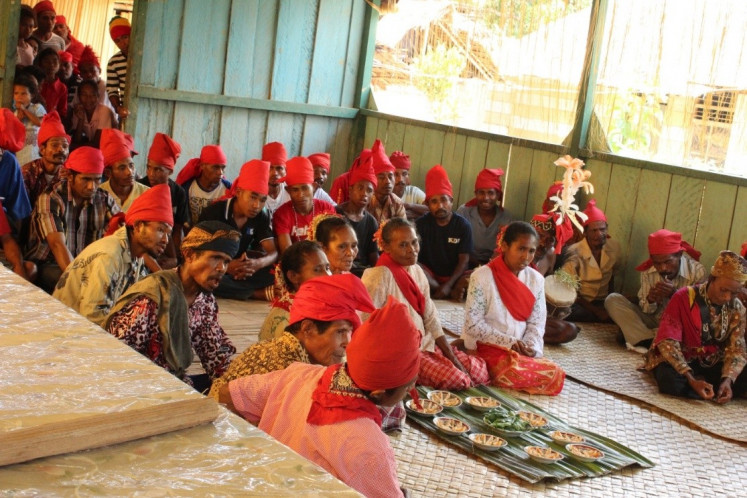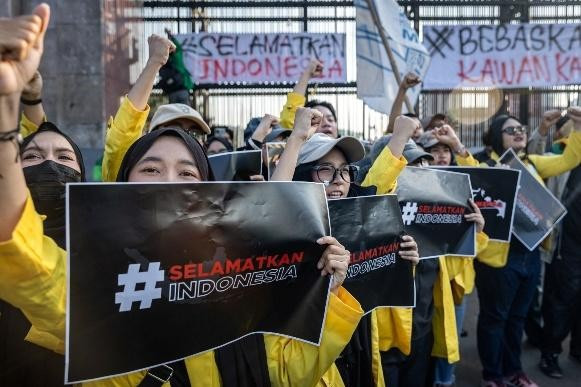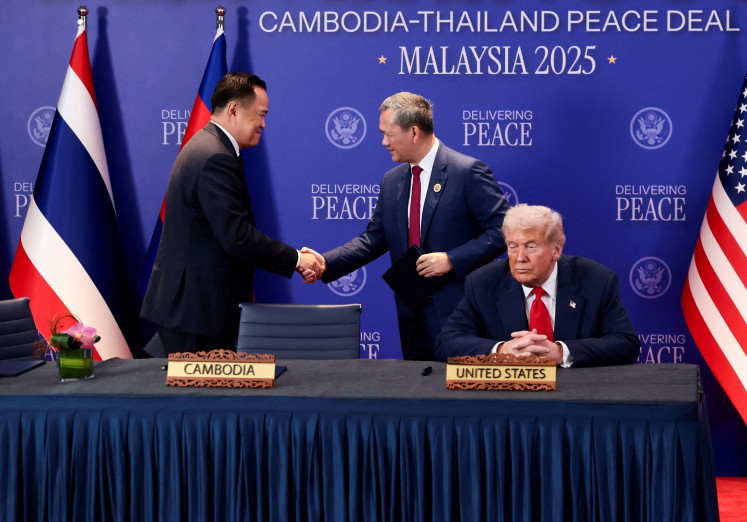Popular Reads
Top Results
Can't find what you're looking for?
View all search resultsPopular Reads
Top Results
Can't find what you're looking for?
View all search resultsCan 'kids zaman now' fight corruption better?
Change text size
Gift Premium Articles
to Anyone
They have been called narcissistic, lazy and demanding. But is today’s generation really that bad?
Indonesia's young generation of those currently under 30 is the center of attention, as evident with the popularity of the meme titled kids zaman now (kids these days).
Presently our youth make up nearly 30 percent of the country’s population. This generation is often viewed positively as a demographic bonus given the youth bulge of the population curve until 2050.They are very familiar with social media, technology, and have significant business orientation – and that's what makes them worth considering.
They are characterized by the way technology and market mechanisms radically change how ideas are presented and distributed. Yet this generation is undermined by the uncertainty, ambiguity, and pessimism of previous generations. They are forced to adapt to the world's rapid mutation and crisis.
But just like the older generation, they are confined by one serious problem: corruption. It repeatedly violates their fundamental rights that reduce the quality of life through poor school construction, minimal health insurance and massive unemployment. Particularly for those lacking “marketable” skills, and have minimum education and little work experience, there seems few options to escape marginalization and social exclusion other than corruption.
So can this young generation fight corruption if while they are also among main victims?
The anti-corruption discourse in Indonesia has yet to place young people at its center. According to a recent survey by Transparency International, a global NGO, up to half of young people in Indonesia assume that a person's success in life can be achieved by engaging in corrupt practices such as lying, cheating and breaking the law. Being vulnerable can compromise integrity, almost 70 percent of young Indonesians said they have given a bribe because they had no choice to access good public services.
We need to empower the youth in the anti-corruption movement. Here we could look at the concept of critical youth empowerment from the scholar Louis B. Jennings and his colleagues.
These are based on six key dimensions of young people's critical empowerment: (1) a friendly and safe environment; (2) meaningful participation and involvement; (3) partnerships between youth and adults; (4) involvement in critical reflection on interpersonal and sociopolitical processes; (5) participation in socio-political processes to influence change, and (6) individual and integrated community empowerment. The scheme considers outcome measurement, challenges and opportunities for empowerment within youth organizations.
Young people's involvement is an essential part of open and inclusive governance, promoting transparency and accountability.
For instance, participatory budgeting or citizen-led procurement allows for direct oversight of allocation of public resources to effectively reduce power abuse. Monitoring and evaluation may also directly impact accountability by raising the moral cost or reputation of public officials. By uncovering government offenses through monitoring and evaluation, young people would also be able to identify irregularities.
Some examples can be seen through mechanisms of public expenditure tracking and public revenue monitoring. Both schemes seek to involve the public in monitoring public spending to help identify embezzlement of public funds. The model or approach of citizen scorecards, report cards and citizen feedback through youth-initiated social audit mechanisms also allow communities to provide feedback to administrators and government regarding public services to dismantle bribery.
The youth or kids zaman now have all the prerequisites for fighting corruption. They are strong in numbers, interconnected, have no interest in maintaining the status quo and they also want to shape a better future. In many parts of the world, proof that young people as actors in the forefront of the anti graft movements can be found.
Young people aged 13-25 have led large anti-corruption demonstrations, from Venezuela, Brazil, Russia, to Dominica. In Indonesia, we have also witnessed many young people striving to fight for the Corruption Eradication Commission (KPK) and demand the completion of mega-corruption cases including that of the e-ID card.
The youth fight in the typical 21st century way: bombarding officers with selfies and video-blogging and spread online petitions. Messages about the demonstrations are shared via chat groups. Demonstrations are broadcast online with hashtags. Technology is used to strengthen the youth, who not only demand change, but become part of the change.
Integrity, just like corruption, can be learned. Unfortunately, in our country, corruption has been tolerated from generation to generation. Thus corruption must be placed in a more revolutionary framework.
Investing in kids zaman now in anticorruption fight will yield gains not only for now, but also the future.
***
The writer is a scholar in transnational crime from the University of Indonesia. He is a research analyst at Transparency International Indonesia. Alvin also works as a data analyst in the LAPOR! -SP4N taskforce working on improved data ecosystem of public reports of public services. He can be contacted on the email alvinnicola@protonmail.com
---------------
We are looking for information, opinions, and in-depth analysis from experts or scholars in a variety of fields. We choose articles based on facts or opinions about general news, as well as quality analysis and commentary about Indonesia or international events. Send your piece to academia@jakpost.com.










